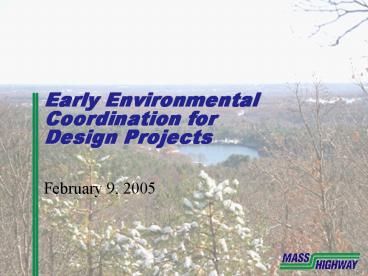Early Environmental Coordination for Design Projects - PowerPoint PPT Presentation
1 / 66
Title: Early Environmental Coordination for Design Projects
1
Early Environmental Coordination for Design
Projects
- February 9, 2005
2
Yearly Advertising Program
- 400 million FY 1991
- 470 million FY 2004
- 600 million (projected) FY 2005
- 500 600 million out years
3
Statewide Transportation Improvement Program
(STIP)
- Fiscally Constrained Need to advertise
everything that is in the STIP - FY 2003 Only Advertised 30
- FY 2004 Only Advertised 56
- FY 2005 Targeted Goal 100
4
Transportation Need versusAvailable Funding
- Increase advertising
- Improve meeting STIP Targets (Planning)
- Improve accountability in Federal Programming
(Funding) - Increased credibility of yearly advertising
program
5
Elements for Advertising
- Plans, Specifications and Estimates (PS E)
- All necessary permits obtained
- Rights of Way acquisition (ROW)
6
Project Development Process
- Design Schedule within control of consultant
- Design Review Schedule within control of
MassHighway
7
Environmental Approvals
- Applications set schedule
- Agency review varies
- Many approval processes are sequential
8
What We Can Control
- Understanding of permit application requirements
- Understanding of approval process and schedules
- Limit number of surprises
9
Coordination During Project Development
- Environmental Approvals
- Context Sensitive Design
- Communities First
- Smart Growth
10
Early Environmental Coordination
- Goal
- Receipt of all permits coincides with 100-percent
design submittal
11
Schedule (24-month timeline)
NOTICE TOPROCEED
100 DesignPSE
25 Design
96 weeks
40 weeks
104 weeks
75 Design
Notice of Intent(30-60 days) MEPA (45
days) ACOE Section 404(60 days) Section
4(f)(120-180 days) Water QualityCertification(
120-150 days)
12
Early Coordination for Design Projects
- Community issues
- Environmental issues
- Design parameters
- Permit identification
- Context-sensitive solutions
- 25 design plans
13
Plan Ahead for Permit Process
- Permit section of contract is starting point
- Field work can reveal unexpected conditions
- Advanced design can identify further unexpected
impacts
14
(No Transcript)
15
Plan Ahead for Permit Process
- Permit section of contract is starting point
- Field work can reveal unexpected conditions
- Advanced design can identify unexpected impacts
16
Existing Conditions
- Office research
- Field work
- Document results in Early Environmental
Coordination 25 Design Submittal
17
Early EnvironmentalChecklist
18
Existing Conditions
- Office research
- Field work
- Document results in Early Environmental
Coordination 25 Design Submittal
19
Coordination/Office Research
- Send Letter to Local Historic Commission
- Send Letters to other Local Boards, Commissions,
and interested parties - Review known hazardous material releases with
local Fire Department - Send letter to Massachusetts Natural Heritage
Program - Send letter to Federal Resource Agencies
20
On-Line Information
- MassHighway Environmental Section
www.mass.gov/mhd/environ - Department of Environmental Protection
www.mass.gov/dep - Army Corps of Engineerswww.nae.usece.mil/
- MassGISwww.mass.gov/mgis/
21
MassHighway Environmental
22
Sample Letters
23
Sample Forms
24
MassGIS
25
(No Transcript)
26
(No Transcript)
27
(No Transcript)
28
(No Transcript)
29
(No Transcript)
30
Existing Conditions
- Office research
- Field work
- Document results in Early Environmental
Coordination 25 Design Submittal
31
(No Transcript)
32
(No Transcript)
33
(No Transcript)
34
(No Transcript)
35
(No Transcript)
36
(No Transcript)
37
(No Transcript)
38
(No Transcript)
39
(No Transcript)
40
(No Transcript)
41
(No Transcript)
42
(No Transcript)
43
(No Transcript)
44
(No Transcript)
45
(No Transcript)
46
(No Transcript)
47
(No Transcript)
48
Existing Conditions
- Office research
- Field work
- Document results in Early Environmental
Coordination 25 Design Submittal
49
Early EnvironmentalChecklist
50
Put Field Data on Plans
- Existing and proposed drainage structures
- Bridges, culverts within/adjacent to project
limits - Include all MassHighway structure numbers
- Label all historical/locally significant
monuments and markers - Publicly-owned parks
- Label tops and bottom of slopes with
takings/easements
51
Sample Plan
52
Proposed Alignment
53
Proposed Toe of Slope
54
Wetland and Water Resources
- Wetland Resources within 100 feet of project
limits - Show location of wetland replacement and
compensatory flood storage - Bridge rehabilitation/replacement photos of four
quadrants
55
(No Transcript)
56
Wetland Delineation
57
Trees with Diameter 14 inches
58
Cultural Resources
- Show all bridges and culverts with MassHighway
numbers - Illustrate historic buildings/structures/district
boundaries - Provide photos
- Label street address
- Label significant monuments/markers
- Detail of typical street light
59
(No Transcript)
60
Historic Stone Wall
61
Culverts or Bridges(with MHD )
62
Property Lines and Building Footprints
63
Include Office Research
- Letters and correspondence from local Boards
- Letters from State/Federal Agencies
- Photos of historic structures
- Photos of river banks where work will occur
64
Schedule (24-month timeline)
NOTICE TOPROCEED
100 DesignPSE
25 Design
96 weeks
40 weeks
104 weeks
75 Design
Notice of Intent(30-60 days) MEPA (45
days) ACOE Section 404(60 days) Section
4(f)(120-180 days) Water QualityCertification(
120-150 days)
65
(No Transcript)
66
Questions































